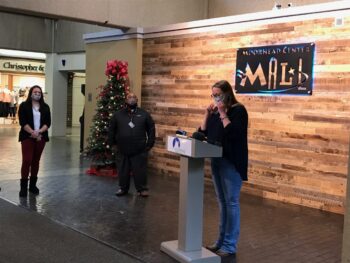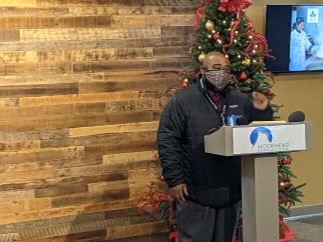By Bob Hulteen
Almost a decade ago, the pastor of a Minneapolis congregation noticed that four predatory lending options had opened within blocks of the church in just a few months. With a gospel ear to the scriptural call to care for the community, he preached a sermon and the members of his congregation were inspired to engage the debt trap that is payday lending in Minnesota.

City leaders explain Moorhead’s new ordinance on payday lending.
Now, years later, Minneapolis Area Synod congregations continue to raise the issue as the synod’s issue-organizing addressing payday with statewide partners gains traction. Beginning January 1, payday lenders in Moorhead will no longer be allowed to charge their signature triple-digit interest rates to borrowers. Loans from these businesses in Moorhead average more than 200% interest rates, trap borrowers in a pattern of repeat borrowing, and often result in financial devastation for families who are already struggling financially.
This first-of-its-kind licensure ordinance, passed by the Moorhead City Council in June, includes an annual interest rate cap of 33% and a limit of two loans per borrower per calendar year (to interrupt the repeat borrowing and rolling over of loans). Lenders will no longer be permitted to require repayment on the borrowers next payday, but offer a minimum of 60 days for repayment. As the implementation date approached, city leaders – including Mayor Johnathan Judd, City Councilmember Heidi Durand, and Rep.-elect Heather Keeler – held a press conference on December 30 at Moorhead City Hall to further explain the new ordinance.
FAITH COMMUNITIES, COMMUNITY organizations, and former borrowers have long sought to limit the amount of damage payday lenders could inflict on working Minnesotans. But the combination of legislative gridlock and a powerful payday industry that exerts power at the Capitol through financial donations has resulted in a failure to protect Minnesota families from these debt traps through legislative action.

Moorhead Mayor Johnathan Judd describes the importance of consumer protection from predatory lenders.
“Minnesota’s cities are ready to take up the mantle if the state legislature does not work to protect the state’s citizens from predatory lenders, “says Meghan Olsen Biebighauser, congregational organizer for the Minneapolis Area Synod and organizer with Minnesotans for Fair Lending. “We can no longer wait to get a fair deal when these predatory businesses can charge more than six times what credit card companies do.”
In response to communities being drained of capital by payday lenders, cities around the state are ready to replicate what is becoming known as the “Moorhead Model.” “Predatory lending does not serve our residents or community,” states Moorhead City Manager Dan Mahli. “The interest and fees on payday loans – on average over 200% – are outrageous and put those who can least afford it into perpetual cycles of debt. We stand ready to share what we’ve learned and accomplished with communities around the state and region.”
Seventeen states and the District of Columbia have passed stringent laws protecting consumers from these predatory loan products — most recently Nebraska, and in 2016 76% of South Dakotans voted in support of a ballot measure capping interest rates at 36%. North Dakota also boasts stronger payday lending protections than Minnesota.
“We commend Moorhead’s action to protect their residents — the city has seen the harm done by these predatory lenders and stepped up in an inspiring way,” comments Yasmin Farahi, Senior Policy Counsel for the Center for Responsible Lending, the national coalition of organizations working to protect consumers. “We support reforms that will stop the extraction of wealth from vulnerable communities in Minnesota and across the country, and that will encourage healthy and responsible resources that truly benefit low-income people.”
Recently Nebraska passed stringent lays protecting consumers, and in 2016 76% of South Dakotans voted in support of a ballot measure capping interest rates at 36%. North Dakota also boasts stronger payday lending protections than Minnesota.
Olsen Biebighauser explains that Christian scripture offers clear warnings about taking advantage of people in vulnerable circumstances. “There are even ‘woes to those’ who use the cover of extreme need to pull limited resources of working poor people,” she adds. “The church has long been at the forefront of efforts to protect people caught in the poverty trap.”
–30–
Northwestern Minnesota media coverage of the Minnesotans for Fair Lending press conference:

